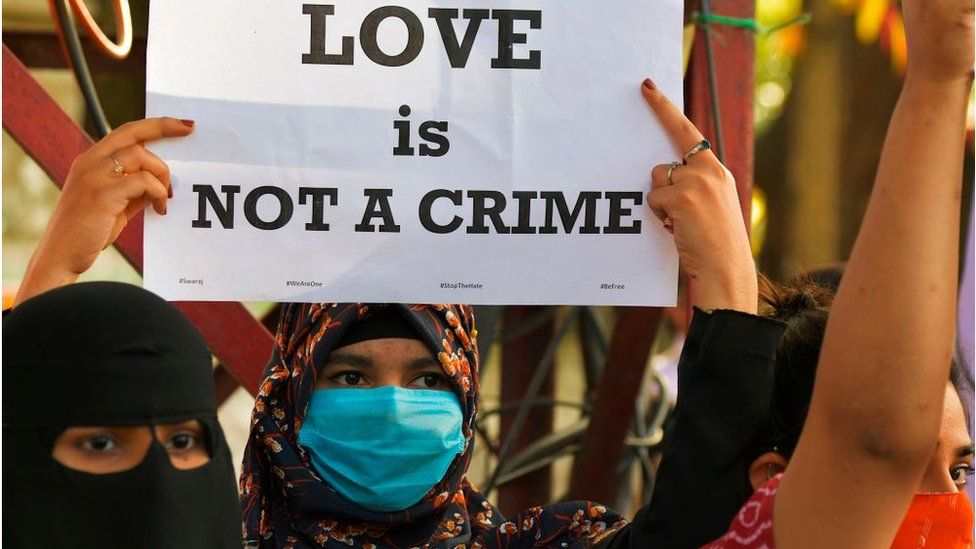
Earlier this month, a video clip went viral in India.
It showed a group of men, with orange scarves draped around their necks, heckling a woman in Moradabad town in the northern state of Uttar Pradesh.
“It’s because of people like you that this law had to be enacted,” one of the men scolds her.
The hecklers were from Bajrang Dal, a hardline Hindu group which supports Prime Minister Narendra Modi’s Bharatiya Janata Party (BJP).
The law they are talking about is the Prohibition of Unlawful Religious Conversion Ordinance that the state recently brought in to target “love jihad” – an Islamophobic term radical Hindu groups use to imply that Muslim men prey on Hindu women to convert them to Islam through marriage.
The incident in the video took place on 5 December. The Bajrang Dal activists handed over the 22-year-old woman, her husband and his brother to the police, who then sent her to a government shelter and arrested the men.
Days later, the woman, who was seven weeks pregnant, alleged she suffered a miscarriage while in custody.
Earlier this week, a court allowed her to return to her husband’s home after she told the magistrate that she was an adult and had married the Muslim man by choice. Her husband and brother-in-law remain in jail.
In media interviews since being released on Monday evening, she has accused the staff at the shelter of mistreating her and said that her initial complaints of stomach pain were ignored. The shelter has denied the allegations.
“When my condition deteriorated, they took me to a hospital [on 11 December]. After a blood test, I was admitted and they gave me injections, after which I started bleeding.”
Two days later, she said, she was given more injections. The bleeding increased and her health worsened, leading to the loss of her baby, she says.
Whether that is true and what exactly happened in the hospital is still unclear.
On Monday morning, while she was still in detention, the authorities rubbished reports that she had miscarried. The reports were based on interviews with her mother-in-law.
The chairperson of the Child Protection Commission, Vishesh Gupta, denied all reports of the miscarriage and went as far as to insist that “the baby is safe”.
A gynaecologist at the hospital where she was treated told reporters that “the seven-week-old foetus could be seen in the ultrasound”. However, the doctor added only “a trans-vaginal test could confirm whether the baby was safe or not”.
But the authorities have not yet commented on the allegations she has made since her release. They have also not given her the results of her ultrasound examinations or details of which medicines she was injected with.
So, five days after she was first taken to hospital, there’s still no clarity on the status of the baby, raising questions and doubts.
But reports that the young woman may have had a miscarriage have caused outrage in India, with many taking to social media to blame the authorities for it.
In India, interfaith marriages have long attracted censure, with families often opposing such unions.
But the new law, which stipulates that anyone wishing to convert must seek approval from the district authorities, gives the state a direct power over the citizens’ right to love and choose a spouse.
It carries a jail term of up to 10 years and offences under it are non-bailable. At least four other BJP-governed states are drafting similar laws against “love jihad”.
Critics have called the law regressive and offensive and said it would be used as a tool to target interfaith couples, especially liaisons between Hindu women and Muslim men.
A petition has also been filed in the Supreme Court, demanding that it be scrapped.
In the short time since it was passed on 29 November, at least half a dozen cases have been reported under the controversial law.
Weddings of interfaith couples, between consenting adults and even those involving parental approval, have been halted and Muslim grooms have been arrested.
The 22-year-old woman says she had converted to Islam and married her Muslim husband in July in Dehradun, a city in the neighbouring state of Uttarakhand. They were intercepted when they came to Moradabad to register their wedding.
“The biggest problem with a law like this is that it treats interfaith love as a criminal activity,” says historian Charu Gupta.
“It also refuses to believe that a woman has agency, it disregards her free will. Isn’t it a woman’s choice who she wants to marry? And even if she wants to convert to another religion, what is the problem?
“This law,” she says, “is so wide in its range and scope, and it puts the onus on those charged under it to prove their innocence. And that is very dangerous.”
This story first appeared on bbc.com
